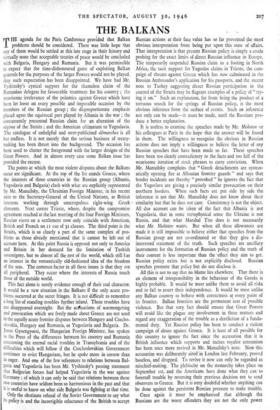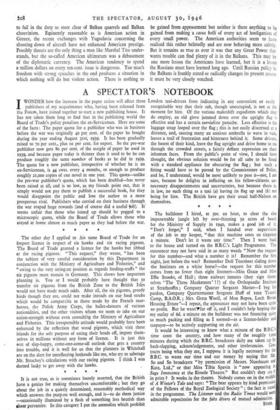THE BALKANS
111 HE agenda for the Paris Conference provided that Balkan 1 problems should be considered. There was little hope that any of them would be settled at this late stage in their history and virtually none that acceptable treaties of peace would be concluded with Bulgaria, Hungary and Rumania. But it was permissible to expect that the time-dishonoured game of exploiting Balkan quarrels for the purposes of the larger Powers would not be played. Any such expectation has been disappointed. We have had Mr. Vyshinsky's cynical support for the shameless claim of the Rumanian delegate for favourable treatment for his country ; the wearisome irrelevance of the polemics against Greece which have been let loose on every possible and impossible occasion by the members of the Russian group ; the disproportionate emphasis placed upon the equivocal part played by Albania in the war ; the concurrently presented Russian claim for an alteration of the rOgime of the Straits ; and the American ultimatum to Yugoslavia. The catalogue of unhelpful and over-publicised demarches is all but endless. It is not merely that the serious business of treaty- making has been thrust into the background. The occasion has been used to clutter the foreground with the larger designs of the Great Powers. And in almost every case some Balkan issue has provided the excuse.
The points at which the most violent disputes about the Balkans occur are significant. At the top of the list stands Greece, where the interests of three countries in the Russian group (Albania, Yugoslavia and Bulgaria) clash with what are explicitly represented by Mr. Manuilsky, the Ukrainian Foreign Minister, in his recent note to the Secretary-General of the United Nations, as British interests working -through unscrupulous right-wing Greek elements. Next comes Trieste, where, despite the compromise agreement reached at the last meeting of the four Foreign Ministers, Russian views on a settlement now only coincide with American, British and French on II out of 31 clauses. The third point is the Straits, which is so clearly a part of the same complex of pro- blems as those already mentioned that it cannot be left out of account here. At this point Russia is opposed not only to America and Britain in her demand for the limitation of Turkish sovereignty, but to almost all the rest of the world, which still has an interest in the romantically old-fashioned idea of the fieedom of the seas. The common factor in all these issues is that they are all peripheral. They occur where the interests of Russia touch those of the outside world.
This fact alone is surely evidence enough of their real character. It would be a new situation in the Balkans if the only acute pro- blems occurred at the outer fringes. It is not difficult to remember a long listof standing troubles further inland. These troubles have not disappeared overnight. But the acflusations of warmongering and provocation which are freely made about Greece are not used in the equally acute frontier disputes between Hungary and Czecho- slovakia, Hungary and Rumania, or Yugoslavia and Bulgaria. Dr. Janos Gyoengyoesi, the Hungarian Foreign Minister, has spoken to the Press of the differences between his country and Rumania concerning the eternal racial troubles in Transylvania and of the difficulties which will follow if the Czechoslovakian Government continues to evict Hungarians, but he spoke more in sorrow than in anger. And one of the few references to relations between Bul- garia and Yugoslavia has been Mr. Vyshinsky's passing statement that Bulgarian forces had helped Yugoslavia in the war against Germany ; of which it can only be said that relations between these two countries have seldom been so harmonious in the past and that it is useful to know on what side Bulgaria was fighting at that time. Only the obstinate refusal of the Soviet Government to say what its policy is and the incorrigible reluctance of the British to accept Russian actions at their face value has so far prevented the most obvious interpretation from being put upon this state of affairs. That interpretation is that present Russian policy is simply a crude probing for the exact limits of direct Russian influence in Europe. The temporarily suspended Russian claim to a footing in North Africa, the tacit support for Yugoslav claims in Trieste, the cam- paign of threats against Greece which has now culminated in the Russian Ambassador's application for his passports, and the recent note to Turkey suggesting direct Russian participation in the control of the Straits may be flagrant examples of a policy of" try-. ing it on." Such an explanation, far from being the product of a tortuous search for the springs of Russian policy, is the most obvious inference from the surface of events. Such an inference not only can be made—it must be made, until the Russians pro- duce a better explanation.
It is useless to examine the speeches made by Mr. Molotov or his colleagues at Paris in the hope that the answer will be found in them. The willingness to recognise the obvious in Russian actions does not imply a willingness to believe the letter of any Russian speeches that have been made so far. These speeches have been too clearly contradictory to the facts and too full of the wearisome iteration of stock phrases to carry conviction. When Mr. Manuilsky complains that "Greek detachments are system- atically opening fire at Albanian frontier guards" and says that border incidents are thereby " provoked " he ignores the fact that the Yugoslays are giving a precisely similar provocation on their northern borders. When such facts are put side by side the inference is not that Mr. Manuilsky does not know about their • similarity but that he does not care. Consistency is not the object. All due account can be taken of the fact that Albania is not Yugoslavia, that in some metaphysical sense the Ukraine is not Russia, and that what Marshal Tito does is not necessarily what Mr. Molotov wants. But when all these allowances are made it is still impossible to believe either that speeches from the Russian group are not co-ordinated or that they give a dis- interested statement of the truth. Such speeches are ancillary instruments for the formation of Russian policy and the truth of their content is less important than the -effect they aim to get. Russian polity exists but is not explicitly disclosed. Russian speeches promote that policy but do not disclose it.
All this is not to say that no blame lies elsewhere. That there is an element of irresponsibility in the behaviour of the Greeks is highly probable. It would be most unlike them to avoid all risks and to fail to assert their independence. It Would be most unlike any Balkan country to behave with correctness at every point of its frontier. Balkan frontiers are the permanent seat of possible violence. But that very fact should ensure that Great Powers will avoid like the plague any involvement in these matters and regard any exaggeration of the trouble as a dereliction of a funda- mental duty. Yet Russian policy has been to conduct a violent campaign of abuse against Greece. It is least of all possible for this country to ignore the fact • since the accusation that it is British influence which supports and incites royalist extremism has been once more revived in Mr. Manuilsky's note. Now this accusation was deliberately aired in London last February, proved baseless, and dropped. To revive it now can only be regarded as mischief-making. The plebiscite on the monarchy takes place on September 1st, and the Americans have done what they can to forestall trouble by reversing their previous decision not to send observers to Greece. -But it is very doubtful whether anything can be done against the persistent Russian pressure to make trouble.
Once again it must be emphasised that although the Russians are the worst offenders they are not the only power to fail in the duty to steer clear of Balkan quarrels and Balkan chauvinism. Eminently reasonable as is American action in Greece, the recent exchanges with Yugoslavia concerning the shooting down of aircraft have not enhanced American prestige. Possibly threats are the only thing a man like Marshal Tito under- stands, but the so-called American ultimatum was a debasement of the diplomatic currency. The American tendency to spend a million dollars on every ten-cent. issue is dangerous. Too much freedom with strong speeches in the end produces a situation in which nothing will do but violent action. There is nothing to be gained from appeasement but neither is there anything to be gained from making a casus belli of every act of hooliganism of every small power. The American authorities seem to have realised this rather belatedly and are now behaving more calmly. But it remains as true as ever it was that any Great Power that wants trouble can find plenty of it in the Balkans. This may be one more lesson the Americans have learned, but it is a lesson the Russians must have learned long ago. Until Russian policy in the Balkans is frankly stated or radically changes its present course it must be very closely watched.



























 Previous page
Previous page